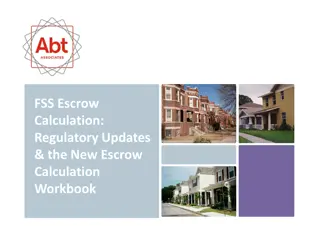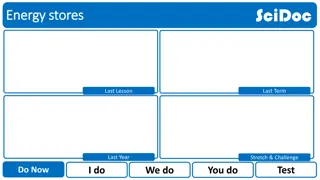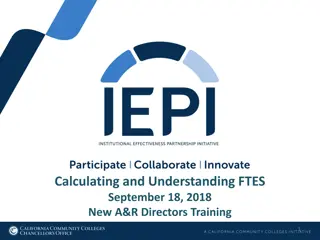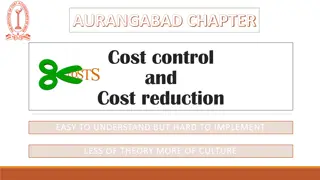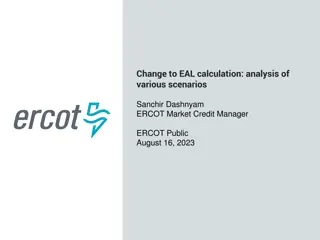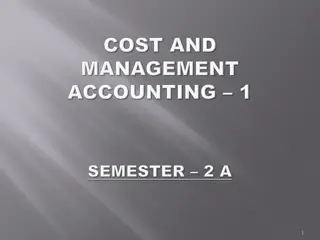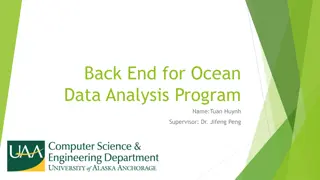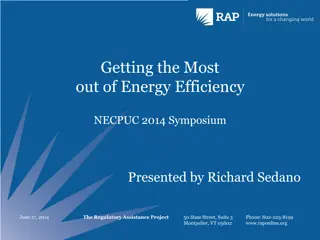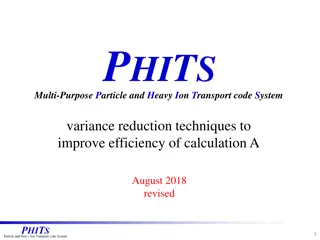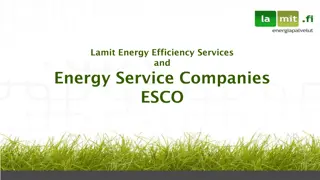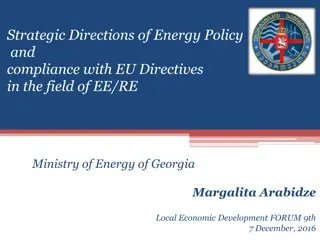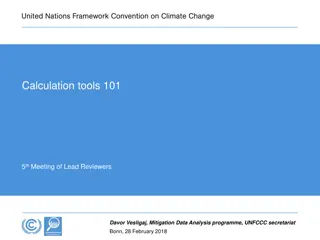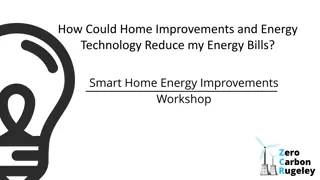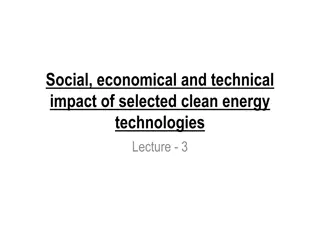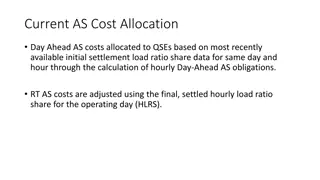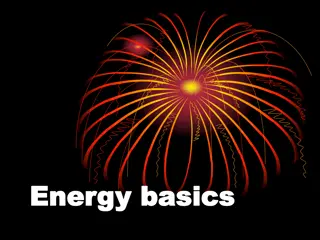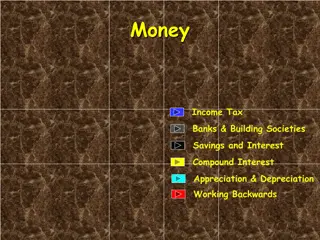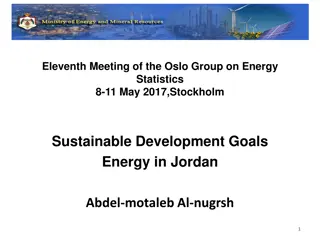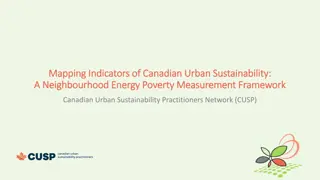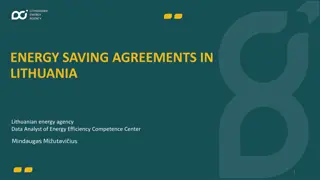Green Energy Market
Green energy also referred to as clean energy, is usually derived from natural sources that are constantly replenished. Solar energy, wind energy, hydroelectric power, biomass energy, geothermal energy, tidal energy, and wave energy are different types of renewable energy. Solar energy is the radian
6 views • 6 slides
Comprehensive Overview of Energy Balances in Germany
This material covers various aspects of energy balances in Germany, including components of energy flowcharts, renewable energy sources in the German energy balance, and total final consumption of road transport energy. It provides a detailed analysis of energy imports, domestic extraction, losses,
2 views • 10 slides
Understanding Energy: Types, Potential, and Kinetic
Dive into the world of energy with a comprehensive guide covering the definition, types, and characteristics of gravitational, potential, and kinetic energy. Explore how energy is the driving force behind all work and movement, with examples and explanations provided for each energy type. Gain insig
2 views • 24 slides
Sustainable Energy Initiatives at Local Level in Lithuania
The National Parliamentary Workshop on Energy Efficiency highlighted the importance of renewable energy development and sustainability at the local level in Lithuania. Initiatives such as the Breakthrough package and Renewable Energy Communities aim to improve energy efficiency, reduce energy povert
2 views • 12 slides
FSS Escrow Calculation and Regulatory Updates Summary
Comprehensive overview of the new escrow calculation workbook, regulatory updates, and changes to the Final Rule for FSS escrow calculation. Key topics include FSS terminology, calculation examples, and important points for locally generated housing funds. The Final Rule changes include uncapped esc
4 views • 9 slides
Comprehensive Cost Management Training Objectives
This detailed training agenda outlines a comprehensive program focusing on cost management, including an overview of cost management importance, cost object definition, cost assignment, analysis, and reporting. It covers topics such as understanding cost models, cost allocations, various types of an
2 views • 41 slides
Exploring Energy Stores and Transfers in Science Lessons
Dive into the fascinating world of energy stores and transfers through engaging science lessons. Recall different energy stores, common energy transfers, and create flow diagrams to illustrate energy transfers in various scenarios. Explore gravitational, elastic, magnetic, electrostatic potential en
5 views • 9 slides
Understanding Cost Accounting Essentials
This overview delves into topics such as financial accounting, classification of accounts, cost ascertainment, and management accounting. It covers the meaning of cost, methods and techniques of costing, advantages and limitations of cost accounting systems, and essentials for a robust cost accounti
4 views • 27 slides
Energy Assistance Workshop Series Statewide Assessment
The Energy Assistance Workshop Series conducted a statewide assessment to understand energy burden and discuss utility energy assistance programs. The goal was to evaluate the effectiveness of mechanisms for energy assistance to prioritize households with higher energy burdens. The workshops aimed t
0 views • 26 slides
Understanding FTES Calculation in California Community Colleges
California Community Colleges use Full-Time Equivalent Students (FTES) to allocate apportionment revenue based on student attendance. FTES calculation involves factors like clock hours, class hours, passing time/breaks, and multiple-hour classes. Understanding these components is essential for educa
0 views • 35 slides
Understanding Energy Transformation in the Natural World
Energy transformation occurs continuously in various forms around us, following the Law of Conservation of Energy. From thermal to chemical and electromagnetic energy, different types of energy are converted and utilized in everyday processes. Examples include the conversion of thermal energy to ele
0 views • 27 slides
Understanding Energy - Forms, Calculations, and Applications
Explore the concept of energy through various images, including forms of energy, kinetic versus potential energy, and calculations involving kinetic and potential energy. Learn about identifying energy states, calculating kinetic energy, and solving physics problems related to energy transfer. Dive
0 views • 27 slides
Cost Control and Cost Reduction Strategies in Business: Understanding Implementation Challenges
Understanding the concepts of cost control and cost reduction is crucial for businesses, but implementing them can be challenging. This chapter explores the influencing factors for success in cost control and reduction, emphasizing the importance of cultural aspects, leadership, and management appro
1 views • 15 slides
Understanding Activity-Based Costing (ABC) in Cost Management
Activity-Based Costing (ABC) is a strategic costing method that allocates overhead costs to products based on activities. It offers benefits such as accurate cost allocation and identifying cost drivers but also has challenges due to increased complexity and customization. ABC differs from tradition
1 views • 15 slides
Understanding Energy Transfers with Sankey Diagrams
Sankey diagrams are visual tools that depict energy transfers within a system, offering insights into efficiency and energy distribution. By examining the width of arrows representing energy flow, one can analyze useful and wasted energy outputs. Inefficient systems show a disproportionate amount of
1 views • 9 slides
Analysis of Change in EAL Calculation Scenarios
In this analysis, Sanchir Dashnyam, the ERCOT Market Credit Manager, discusses the change in the EAL calculation formula, exploring different scenarios and their impacts on ERCOT markets. The scenarios involve adjustments to the application of RFAF against various parameters, aiming to optimize the
0 views • 7 slides
Understanding the Cost of Capital in Finance
The cost of capital is crucial for businesses to determine the average cost of their finance. The Weighted Average Cost of Capital (WACC) is used as a discount rate in financial calculations. It involves estimating the cost of each source of finance and calculating a weighted average. Additionally,
0 views • 14 slides
Understanding Cost Accounting: Techniques and Processes
Cost accounting is a specialized branch of accounting that involves the accumulation, assignment, and control of costs. It encompasses techniques like ascertainment of costs, estimation of costs, and cost control to aid in decision-making. Cost accounting plays a crucial role in budgeting, standard
2 views • 11 slides
Conducting an Effective School Energy Audit
Performing an energy audit at a school helps in understanding energy usage patterns, identifying areas of waste, and creating energy-saving action plans. The audit involves collecting data, creating switch-off lists, and filling out templates methodically to track energy consumption. It should be do
0 views • 16 slides
Report on Effective Cost Recovery Rates by UNDP for 2014-2017
The joint report on cost recovery by UNDP for the years 2014-2017 provides detailed evidence and analysis of the effective average cost recovery rates, compliance with cost recovery policy, and calculations based on financial information. The report highlights contributions from various sources, inc
1 views • 23 slides
Understanding Kinetic and Potential Energy: A Visual Exploration
Delve into the concepts of kinetic and potential energy through engaging visuals and explanatory content. Learn about the factors affecting kinetic energy, compare energy levels between objects in motion, explore the calculation of kinetic energy, and discover the storage and examples of potential e
0 views • 15 slides
Introduction to Industrial Costing: Understanding Cost Types and Accounting Systems
Explore the fundamentals of industrial costing, including different cost types and accounting systems such as actual cost accounting, normal cost accounting, and standard cost accounting. Learn about cost data control, tasks of cost accounting, and the integration of cost type accounting in cost and
1 views • 24 slides
Back-End Ocean Data Analysis Program for LCS Calculation
A program designed to automatically retrieve ocean data over an eight-day period and compute Lagrangian Coherent Structures (LCS) on a daily basis. The generated data can then be plotted to visualize the LCS patterns in the ocean. Motivated by guiding fluid flows, the program can aid in predicting t
0 views • 11 slides
Enhancing Energy Efficiency for Sustainable Development
This content covers a symposium on maximizing energy efficiency, presented by Richard Sedano at the NECPUC 2014 event. It introduces the Regulatory Assistance Project (RAP), a non-profit organization aiding government officials in energy and environmental issues with a focus on cost-effective energy
1 views • 27 slides
Efficiency Enhancement in PHITS: Variance Reduction Techniques for Particle and Heavy Ion Transport
Explore techniques for improving calculation efficiency in the PHITS Multi-Purpose Particle and Heavy Ion Transport code system. Topics covered include neutron deep penetration calculation, effective dose calculation, and use of variance reduction techniques to enhance Monte Carlo simulation efficie
0 views • 24 slides
Understanding Different Forms of Energy and Work in Physics
Energy in physics is the capacity to do work, and there are various forms of energy such as radiant energy, kinetic energy, gravitational potential energy, elastic potential energy, chemical potential energy, nuclear potential energy, electrical potential energy, thermal energy, and sound energy. Ea
0 views • 47 slides
Understanding Energy Service Companies (ESCOs) and Their Role in Energy Efficiency
Energy Service Companies (ESCOs) like Lamit offer a range of energy services, from implementing energy-efficiency projects to renewable energy solutions. These companies work as long-term energy management partners, focusing on understanding customer needs, providing energy-saving solutions, and gua
2 views • 18 slides
Overview of Energy Policy and Compliance with EU Directives in Georgia
Ministry of Energy in Georgia focuses on strategic directions for energy policy in alignment with EU directives. The Energy Strategy, Covenant of Mayors, and National Energy Efficiency Action Plan are key initiatives promoting energy efficiency and renewable energy. Projects include consultancy on s
0 views • 10 slides
Overview of Calculation Tools for Mitigation Data Analysis Program under UNFCCC Secretariat
This content discusses various calculation tools used in the Mitigation Data Analysis program of the UNFCCC Secretariat. It includes tools for GHG projections, financial support, and their integration into Country briefs to facilitate accurate data presentation and reduce workload during reviews. De
0 views • 7 slides
Exploring Home Energy Improvements and Smart Technology for Energy Efficiency
Discover how home improvements and energy technology can significantly reduce energy bills. Join the Smart Home Energy Improvements Workshop in Zero Carbon Rugeley to explore approaches for sustainable energy production and usage at home. Learn about retrofitting, smart energy systems, and meet char
0 views • 20 slides
Social, Economical, and Technical Impact of Clean Energy Technologies
This course covers the management of micro-level clean energy projects, emphasizing the social, economic, and technical impacts of selected clean energy technologies. It discusses project organization, tools, project life cycle, financial analysis, barriers, capacity building, and more. It delves in
0 views • 32 slides
Cost Allocation Strategies for Ancillary Services in Electricity Markets
Cost allocation for Ancillary Services (AS) in the electricity market involves distributing costs to Qualified Scheduling Entities (QSEs) based on load ratio share data. Two options are presented: one calculates separate hourly Real-Time Co-optimized Load (RCL) and Non-RCL Load Ratio Share (LRS) for
0 views • 5 slides
Understanding Energy Basics: Temperature, Heat, and Transfer
Explore the fundamental concepts of energy, including temperature, heat, and energy transfer. Learn how temperature differs from heat, how they are measured, and the relationship between thermal energy and water volume. Discover the role of chemical energy and sound energy, and how energy is transfo
0 views • 12 slides
Understanding Elastic Potential Energy and Energy Conservation Principles
Elastic potential energy is stored in elastic bodies like springs and is vital in understanding energy conservation principles. This energy can be calculated using the work done by an ideal spring on a block. By applying elastic potential energy concepts, one can analyze scenarios where a spring sys
0 views • 9 slides
Understanding Energy: Potential and Kinetic Forms in Grade 7 Natural Sciences
Energy in various forms is explored in Grade 7 Natural Sciences, with a focus on potential and kinetic energy. Energy is the ability to do work and exists in different types like heat, chemical, electromagnetic, nuclear, and mechanical. The sun serves as a primary energy source. Potential energy is
0 views • 11 slides
Understanding Income Tax Calculation and Salary Calculation
This educational content covers various aspects of income tax calculation, including taxable rates, personal allowances, and calculations for different salary levels. It explains how to determine weekly, monthly, and annual salaries and provides examples of income tax calculations for different inco
0 views • 23 slides
Energy Strategy and Challenges in Jordan: Towards Sustainable Development
The Eleventh Meeting of the Oslo Group on Energy Statistics discussed the energy sector in Jordan, highlighting challenges such as population growth, energy demand, and high energy costs. Jordan aims to diversify energy resources, reduce oil dependency, and enhance environmental protection through i
0 views • 34 slides
Understanding Inflation and CPI Calculation
Learn about inflation and the Consumer Price Index (CPI) calculation process. Inflation is the rise in the overall price level in an economy, impacting the cost of living. CPI measures the cost of goods and services purchased by an average consumer to track changes in the cost of living over time. T
0 views • 39 slides
Mapping Indicators of Canadian Urban Sustainability: A Framework for Neighborhood Energy Poverty Measurement
The Canadian Urban Sustainability Practitioners Network (CUSP) is implementing a project to reduce energy poverty through local clean energy access programs. The project aims to achieve energy and emissions goals, transition to clean energy, and benefit low/moderate-income households. By utilizing a
0 views • 24 slides
Energy Saving Agreements in Lithuania: Legal Framework and Targets
Lithuania's energy saving agreements are guided by a comprehensive legal framework including laws on energy efficiency and methodologies for energy audits. The country has set ambitious energy efficiency targets for 2030, focusing on sectors like building renovation, industry, and household applianc
0 views • 14 slides




